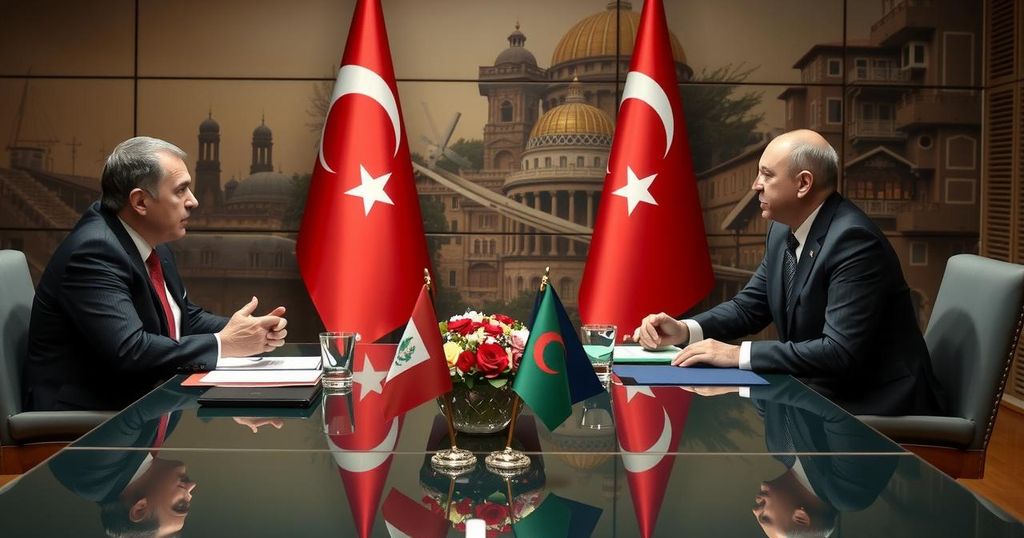Turkey’s Foreign Minister Hakan Fidan met Syrian leader Ahmed al-Sharaa in Damascus to discuss support for Syria’s new administration following Bashar al-Assad’s fall. This meeting reflects Turkey’s objective to help form a state structure and constitution under new leadership while addressing ongoing conflicts with Kurdish forces in the region.
On December 10, Turkey’s Foreign Minister Hakan Fidan engaged in a significant meeting with Syrian leader Ahmed al-Sharaa, also known as Abu Mohammed al-Golani, in Damascus. This meeting is notable following the recent toppling of Bashar al-Assad, where discussions focused on bolstering support for Syria’s emerging administration. The Turkish Foreign Ministry released photographs of the meeting, depicting the two leaders sharing amiable gestures, indicating a cordial diplomatic interaction amidst ongoing conflicts in the region. President Recep Tayyip Erdogan had previously articulated Turkey’s commitment to aiding in the establishment of a new state structure for Syria and its drafting of a new constitution.
This diplomatic effort comes at a time when Turkey has previously aligned itself with various factions seeking to oust Assad, while at the same time hosting millions of Syrian refugees. Following the fall of Assad, Turkey aims to facilitate the return of these displaced individuals and assist in the reconstruction of Syria. Additionally, tensions are escalating in northeast Syria, particularly between Turkey-backed fighters and the Kurdish YPG militia, which Ankara designates as a terrorist organization. Turkey’s defense minister expressed confidence that the new Syrian leadership would succeed in driving YPG combatants from their territories.
Amidst the backdrop of a shifting power dynamic following the civil war and Assad’s downfall, both Turkey and its allies have actively engaged in military operations against Kurdish forces within northern Syria. The outcomes of these interactions are crucial for changing territorial control and political alliances in the region. As circumstances evolve, the Syrian Democratic Forces are facing new challenges as the balance of power tilts towards Turkey and its supporters.
Furthermore, Ibrahim Kalin, head of Turkey’s MIT intelligence agency, visited Damascus shortly after Assad’s departure, highlighting Turkey’s interest in engaging with Syria’s new leadership.
The developments represent a pivotal moment in Turkey-Syria relations as domestic and international winds shift dramatically, and the region braces for further changes in governance and territorial disputes.
The recent meeting between Turkey’s Foreign Minister and Syrian leader Ahmed al-Sharaa comes at a critical juncture in Syrian history, following the fall of long-time President Bashar al-Assad. This meeting signals Turkey’s intent to play a central role in shaping Syria’s political future after years of civil war and foreign intervention. Turkey has long supported rebel factions in Syria, and with Assad’s collapse, there is an opportunity for it to influence the establishment of a new administration and the return of Syrian refugees. The complexity of the situation is exacerbated by ongoing conflicts in northeast Syria involving the YPG militia, which poses a challenge to Turkey’s national security interests.
In summary, the meeting between Foreign Minister Hakan Fidan and Ahmed al-Sharaa represents Turkey’s strategic engagement in Syria’s political reshaping following Assad’s downfall. With aspirations to help reconstruct the nation and address security concerns posed by the YPG militia, Turkey is positioned to wield significant influence in the region. These developments underscore the intricate balance of power in Syria and highlight Turkey’s proactive role amidst the ongoing conflict.
Original Source: www.hindustantimes.com






